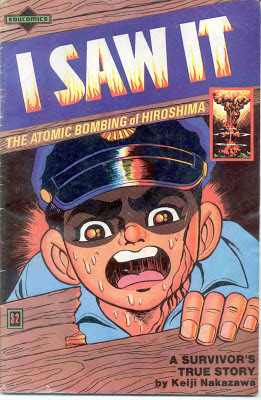
Hillary Schrute's analysis of Keiji Nakazawa's I saw it in her paper Disaster Drawn describes Nakazawa's experience with the atomic bomb of Hiroshima during World War II and explains what emotions he was attempting to evoke through his work. Before having read the story myself, the intended emotion of the story being told felt to still seep through Schrute's paper. I remember reading the portion of her story where she explains that Nakazawa was at school when the bomb dropped - and that he survived only because a wall he was standing by outside had collapsed upon him. After regaining consciousness, the city he once knew had transformed. Akin to waking up in a nightmare, Nakazawa having been greeted by what was left of the people of Hiroshima become monstrous. It's difficult to imagine what living a reality like that would be, but even then simply reading just Schrute's account of the manga was still effective.
Many people would be afraid or disgusted of this work, if explained in concept and even moreso while reading it but that is what makes Nakazawa's piece powerful - because despite the horror, it is real. Schrute managed to stage the story and capture the main beats of the narrative, but reading the manga itself delivered a much more raw impact that I could not have gotten from Schrute's analysis alone. With its graphic depictions and even just seeing what it was that Nakazawa thought, it's easy to understand how this comic gained such merit and success.
In the manga itself, Nakazawa explains that when he went to retrieve the bones of his parents that the bomb had even taken those away from him. It wasn't until then that the effects of him having lost his mother and father really begin to settle in - they were taken and they are gone forever. In a lot of popular media, a character can witness an event and will often react with great emotion immediately, yet Nakazawa's delayed understanding of the situation felt much more powerful than many other death scenes what I've seen in many of the movies I've watched and I think that's because we live as well. We suffer shock in greatly traumatizing events and the pain doesn't settle in until later.
No comments:
Post a Comment